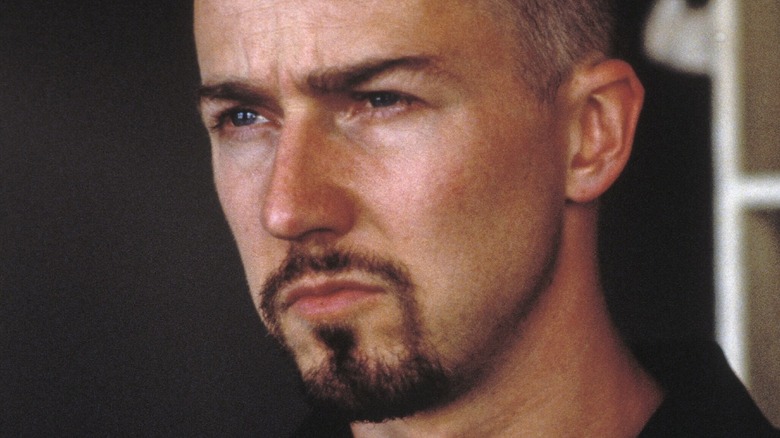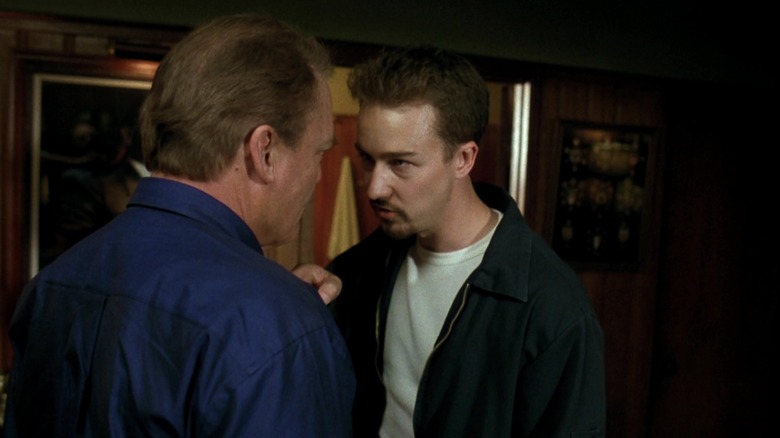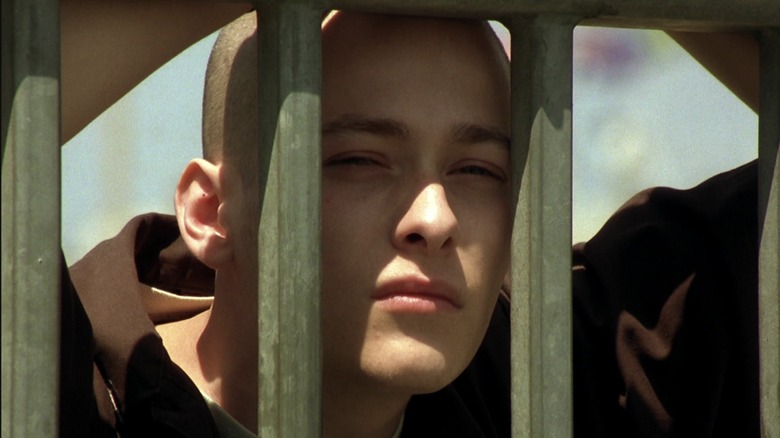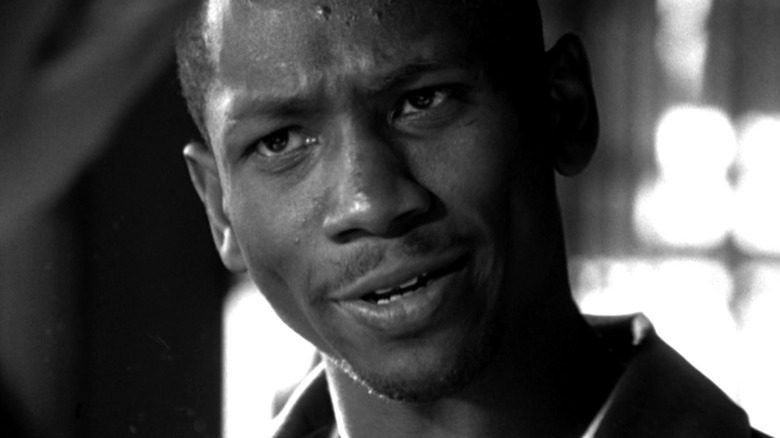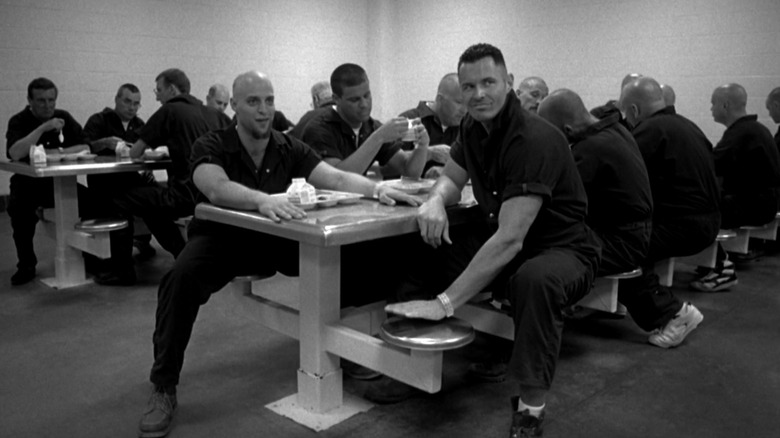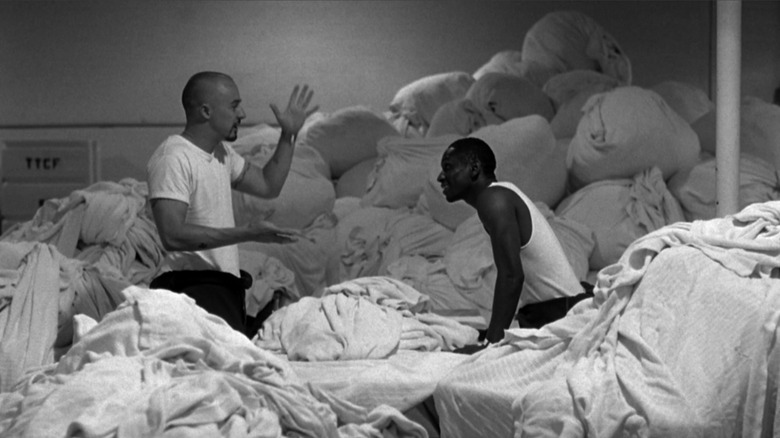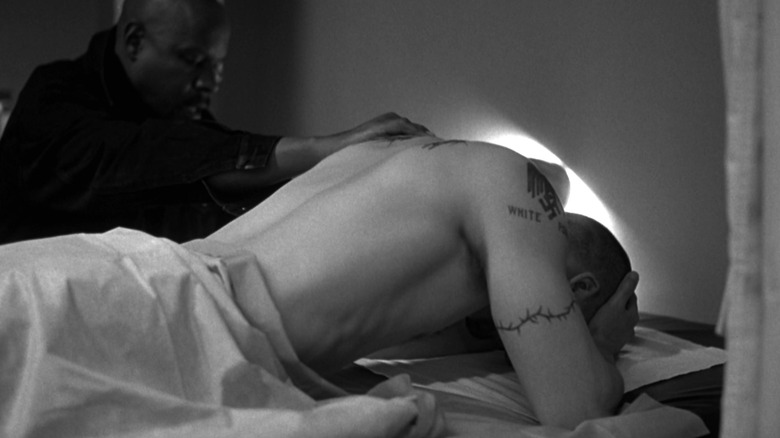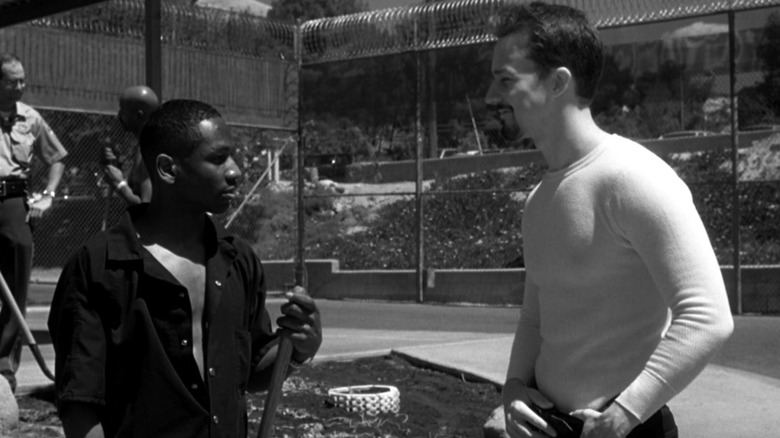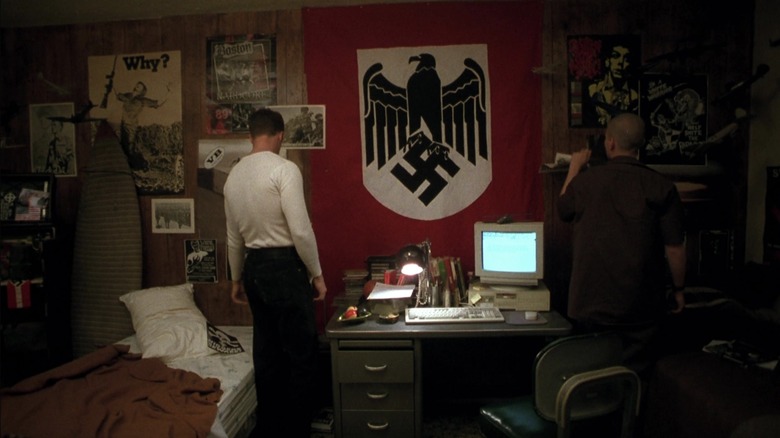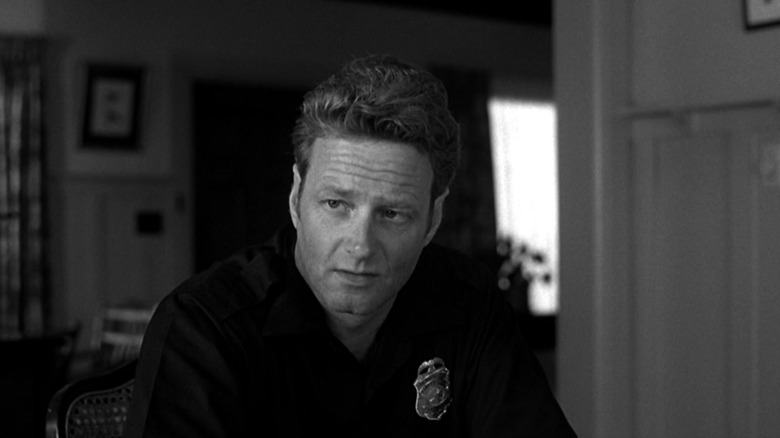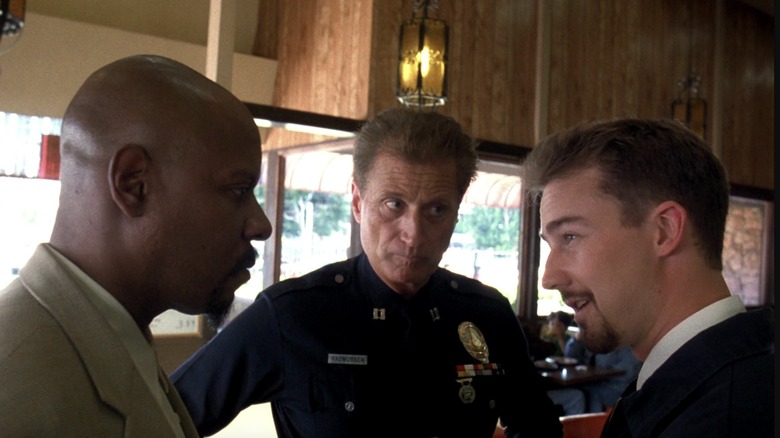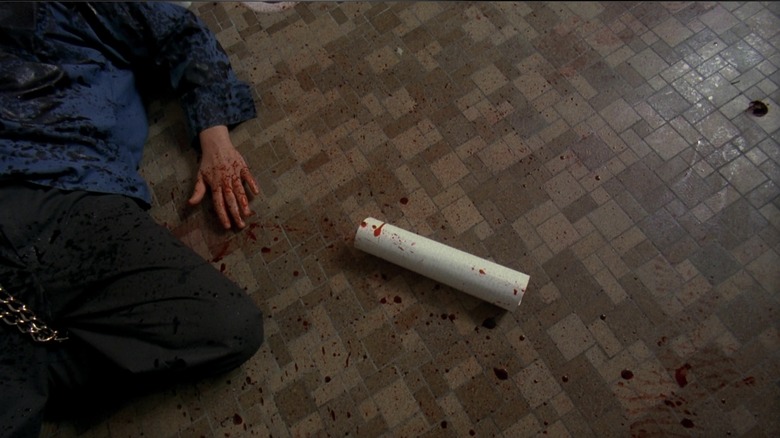The Ending Of American History X Explained
Controversy swirled around Tony Kaye's feature directorial debut, "American History X," when it hit screens in 1998 because of the inflammatory topic it explores — neo-Nazi skinheads proliferating in suburban communities. When Kaye petitioned and failed to have his name removed from the film after New Line Cinema released Edward Norton's cut, Kaye disowned the project (via Den of Geek). Regardless, the film was critically acclaimed, and Norton received an Oscar nod for his performance as Derek Vinyard, a former skinhead grappling with all the harm he's caused.
After Derek's little brother Danny (Edward Furlong) gets in trouble at school for writing a paper celebrating Adolf Hitler's "Mein Kampf," the school's Black principal Dr. Sweeney (Avery Brooks) gives him a new assignment. Over the next 24 hours, Danny is to reflect and write about the events that led to Derek's (Norton) incarceration for voluntary manslaughter. The first half of "American History X" shows us Danny's memories through high-contrast black-and-white flashbacks, depicting how Derek came to kill two young Black men attempting to steal his truck.
We see the events after a reformed Derek is released from prison in living color, showing how his family fell on hard times after he was convicted. They lost their home in Venice Beach, Derek and Danny's mother Doris (Beverly D'Angelo) fell sick, and Cameron Alexander (Stacy Keach), who started the white supremacist gang Disciples of Christ with Derek, inducted Danny into the same group. The film addresses the evils of bigotry in a way that's still relevant today, so let's return to the ending of "American History X" and look at exactly what happens.
Content warning: This article includes references to hate crimes and sexual assault.
Derek is done with the D.O.C.
When Derek is released from prison, it's clear something has changed, but he holds this close to his chest. He doesn't reveal anything to his family until after confronting the leader of the D.O.C. and his former mentor, Cameron Alexander. "American History X" begins the descent toward its violent conclusion halfway through when Derek faces Cameron, who indoctrinated him into white supremacist ideology as a young man.
Some critics, like Variety's Todd McCarthy, have critiqued the film for glossing over how Derek first came to be radicalized by Cameron. While this isn't directly covered, the implication is clear during their confrontation, during which Derek calls Cameron a chickenhawk and accuses him of preying on people. Cameron capitalized on Derek's grief after his father was killed, twisting the boy's mind by exposing him to racist propaganda. Cameron's interactions with Danny give a taste of the rhetoric he must have used to manipulate Derek years before. When Derek tells Cameron, "I'm out. Out! And Danny's out too," all Hell breaks loose, and the members of the D.O.C. who once idolized Derek turn on him.
This shows how the shared hate of a perceived enemy, not loyalty or community, unites this gang. Frank Meeink, a former skinhead who some claim Derek was based on, told the Des Moines Register he was desperate for a community when he was recruited as a teenager. "I was a broken soul," he said. "I was angry. Finally, somebody took an interest in me. I was the perfect target for them to bring me into their world."
It might not be too late for Danny to change his path
When Derek tells Danny, "Those guys, the gang, that life — I'm done with it," Danny is angry and confused. But when he calms down, he wants to understand what happened in prison to change Derek's worldview. This suggests that Danny isn't yet fully entrenched in the white supremacist ideology Cameron spreads to his followers. Despite his associations with the D.O.C. and the hateful rhetoric he spews at Seth (Ethan Suplee) earlier in the film, Danny's primary motivation seems to simply be loyalty to the older brother he idolizes.
This scene between the two brothers, after Derek has announced he wants to leave the D.O.C. in the rearview mirror, also shows that Dr. Sweeney was wise to view Danny as misguided but capable of redemption. These moments argue that, as Sweeney says, people learn hate and bigotry, and they can unlearn it, giving the film a message of tolerance with an emphasis on re-educating the radicalized.
"American History X" seems to support the idea that you can prevent and rehabilitate racist ideology with what we now call anti-racist education. Some critics, like Christopher Hooton of The Independent, have discussed how this message might seem overly forgiving in today's political climate, which is true. However, it's nonetheless a message that the script stands on. When Danny's history teacher Mr. Murray (Elliott Gould) argues for expulsion because of his book report, Dr. Sweeney argues against such measures, saying, "I will not give up on this child yet."
In jail, Derek's racism is challenged
In prison, Derek is assigned work duty in the laundry facility and paired with Black inmate Lamont (Guy Torry). Lamont is friendly despite Derek's icy demeanor and skinhead appearance, but he doesn't mince words when explaining that in prison, Derek is the minority. Suddenly, the power dynamic Derek was accustomed to on the outside is flipped.
The higher incarceration rates of BIPOC wouldn't have surprised Derek, considering the statistics he laced his speech with before the D.O.C. vandalized a Korean-owned market employing undocumented workers earlier in the film. The film is set in 1998, and the incarceration rates of racial demographics weren't the same as they are today, but the 1994 Crime Bill helped foster mass incarceration in the United States. Today, the country has the highest incarceration rate per capita in the world.
His shifted status in prison gives Derek a chance to see things from a new perspective, which is essential to becoming more open-minded and empathetic. As reported in the Des Moines Register, Frank Meeink, the former skinhead Derek may have been based upon, distanced himself from the white group he initially associated with in prison after he started connecting with the Black and Latino inmates he played sports with. He found his new friends more sympathetic when a member of his family died, and this deeply affected his worldview.
Derek joined forces with the Aryan Brotherhood in jail
One grim reality "American History X" explores is how unofficially segregated prisons still are. TV and film have shown this in everything from "Oz" and "Sons of Anarchy" to "Orange is the New Black." In 2005, a former inmate from San Quentin wrote an op-ed for The Los Angeles Times discussing how California prisons still separated new inmates based on race when they were being processed into the facilities, because, "prison is an undeniably racist place."
Despite beginning with an attempted robbery against him, Derek's heinous murder of two Black men is clearly a hate crime. If he had been tried a decade later, after the Matthew Shepard and James Byrd Jr. Hate Crimes Prevention Act became U.S. law, his prison sentence could have looked very different. Because of the racially charged nature of his crime, Derek knew he would be lucky to get out of prison alive, so he joins forces with the Aryan Brotherhood when he arrives to protect himself. But after a year behind bars, Derek starts noticing behavior he can't condone. After voicing his opinions, tensions rise, and Derek is pushed away from the reprehensible people keeping him safe.
If you or a loved one has experienced a hate crime, contact the VictimConnect Hotline by phone at 1-855-4-VICTIM or by chat for more information or assistance in locating services to help. If you or a loved one are in immediate danger, call 911.
Derek and Lamont slowly become friends
Derek slowly thaws in prison, talking about women and sports and sharing a few laughs with Lamont while folding sheets and sorting boxers. Derek sees Lamont's humanity, and through this tenuous friendship, he questions his white supremacist ideology. He draws new conclusions about the inherent racial bias of the criminal justice system when he learns that Lamont got six years for robbery and a bogus assault charge after stealing a television. Meanwhile, Derek only got three years for voluntary manslaughter.
This realization leads Derek to question everything. Although he'd already heard these arguments from people he deemed "liberal democrats," this new kind of exposure forces him to accept them. His conclusions poke holes in the worldview Cameron taught him, leading him to abandon that mindset entirely.
Although Lamont's friendship with Derek is the first sign of him distancing himself from white supremacy in "American History X," it's also been a major criticism against the film. Some have accused "American History X" of using Black characters simply as plot devices, making them the vehicle by which the Vinyard brothers learn their racist views are wrong. Lawrence Baron, cultural historian and Professor Emeritus of Modern Jewish History at San Diego State University, explained to Vice in 2018 that "it is the despised 'other' who teaches the perpetrator tolerance" in the film.
One event severs Derek's ties with the Aryan Brotherhood
After he makes it clear that he wants nothing to do with them anymore, the Aryan Brotherhood sexually assaults Derek as retribution. Dr. Sweeney visits him in the infirmary, where Derek admits to feeling mixed up and seeing holes in the white supremacist ideology Cameron taught him. When Sweeney asks Derek, "Has anything you've done made your life better?" Derek breaks down crying and asks Sweeney for help.
"At that moment, I started crying," Life After Hate Board Chair Tony McAleer told Vice in 2018. "I answered that question for myself the same way he did." Hitting his own version of rock bottom after being assaulted essentially opens Derek's mind to new perspectives and gives him the opportunity to reeducate himself with the books Sweeney brings him. "The key moment of the film for me isn't the cracking someone's head on a kerb [sic]," Edward Norton told The Guardian in 1999. "It's after Derek's been raped in prison"
Despite this being a turning point for the character, some have criticized Sweeney's role in Derek's transformation. Tina Harris, a Professor of Interracial Communications at the University of Georgia, discussed the film with Vice in 2018 as an example of a Black character "helping the white character get to a higher plane," thus putting the onus of reeducation on people of color.
If you or anyone you know has been a victim of sexual assault, help is available. Visit the Rape, Abuse & Incest National Network website or contact RAINN's National Helpline at 1-800-656-HOPE (4673).
Derek realizes Lamont is his only friend in Chino
After Derek breaks ties with the Aryan Brotherhood, Lamont warns him he won't be under the gang's protection anymore, making him vulnerable to violence from other groups in the prison. Derek acknowledges this, but he refuses to go back to the white supremacy group. He spends his last months in prison waiting for an attack, but Lamont helps make sure that doesn't happen, for which Derek thanks him.
When they fist bump as Derek leaves prison, it's clear he's undergone a transformation, and not just because he grows his hair out and starts hiding his tattoos. This is a cumulative shift created by the books Sweeney brought Derek to read and the violence the Aryan Brotherhood directed at him, but it also comes from his friendship with Lamont.
Life After Hate co-founder Frank Meeink told Vice in 2018, "When I talk to people about leaving these thoughts behind, we don't even start out talking about their beliefs. I talk about life. It's just about looking at your life and wondering if it's where you're meant to be." Derek's experiences in prison give him the space to draw his own new conclusions, showing him how vile his past actions truly were.
Derek and Danny remove Nazi paraphernalia from their walls
After Derek tells Danny what happened to him in prison, he explains he can't go back to that life. When they get home from Cameron's party, the two brothers remove the Nazi paraphernalia from the walls of their bedroom, suggesting they have resolved to leave the D.O.C. behind together.
A prison stint shifted Frank Meeink's perspective and softened his racism, but he told NPR that the Oklahoma City Bombing was the last straw for him, leading him to talk to the FBI and work with the Anti-Defamation League. He then turned to helping others renounce white supremacy, writing "Autobiography of a Recovering Skinhead" and co-founding Life After Hate. Derek's transformation also starts because of experiences in prison, but his ultimate motivation to renounce white supremacist ideas is keeping his brother from going down the same evil path.
The Vinyard brothers still have to take action to confirm their resolution to walk an alternative path. Derek growing his hair out and taking down the Nazi posters are outward manifestations of an internal shift in perspective. Tony McAleer, Board Chair of Life After Hate, told Vice, "It really presents an allegory to an exit program. It's a brave, bold film, years ahead of its time." Others, however, like Christopher Hooton of The Independent, argue that Derek's transformation and the film's resolution are a bit too simplistic.
Danny concludes their father planted the seeds of bigotry
In the last black-and-white flashback of "American History X," Danny reflects on a family dinner when their father Dennis (William Russ) spoke angrily about affirmative action and Dr. Sweeney including Black writers in the honors English curriculum. Dennis reveals himself to be deeply racist while also planting the seeds of bigotry and hate in his sons. When the film came out, Todd McCarthy of Variety argued that one of its main messages was that racism begins at home. The film also implies grief watered these seeds after Dennis was killed on the job, and that Cameron weaponized Derek's growing hate by taking him under his wing. "American History X" suggests that hate is learned and can be unlearned, as Dr. Sweeney argues at the beginning of the film.
Whether or not this portrait of the Vinyard brothers is too redemptive and forgiving is up for debate. Lawrence Baron, Professor Emeritus of Modern Jewish History at San Diego State University, told Vice, "Many of these movies render their main characters victims of familial, political, or socioeconomic circumstance rather than as innately evil villains." This could be viewed as a good or bad thing. There's always complexity to people's motivations in the real world, but those who cause real violence — like Derek does in the film — are still responsible for their own actions.
Dr. Sweeney asks Derek to be part of the solution
Toward the end of "American History X," after taking a shower, Derek sees himself in the mirror and covers the swastika on his chest. The regret he feels over his life choices and actions is clear on his face, but much like the tattoos that cover his body, Derek cannot erase his past. Instead, he can only move forward and try to atone.
After learning that Seth and Cameron are in the ICU, Dr. Sweeney and an officer on the gang task force ask Derek to talk to the D.O.C. and argue against retaliation, hoping that he can help prevent a gang war. Derek tries to explain that he's out and probably on the D.O.C. hit list. He says it isn't his responsibility, but Dr. Sweeney disagrees, telling Derek he helped create the situation when he started the D.O.C. with Cameron. If Derek truly wants to atone for the evil he's committed in his past, he has to become part of the solution.
Through Derek's transformation, "American History X" argues that no one is ever too far gone to change their ways. The film is a call for incorporating transformative justice into our prison and parole systems. Although Derek is still slow here to accept responsibility, the film clearly argues that it's everyone's responsibility to dismantle systems of oppression and hate — especially the ones they've participated in.
Danny is shot and killed at school
When asked in an interview with ForenSeek how he came up with the ending of "American History X," screenwriter David McKenna said, "Well, I asked myself, what's the ultimate tragedy?" The film suggests that violence and hate are always a choice, and the cycle of violence is perpetuated when people choose retaliation. After Danny is killed, Derek has a choice. He can go back to his old ways, feeding his grief with more hate and violence like he did when his father died, or he can be the person who breaks the cycle by not retaliating. The tone of the film suggests Derek will embrace Danny's conclusion: "Hate is baggage. Life's too short to be pissed off all the time."
Edward Norton told The Guardian in 1999, "For me, it gives a pretty unequivocal message about letting rage control your life." In 2018, Vice suggested the film underestimated how widespread and dangerous groups like the D.O.C. are. Heidi Beirich, director of the Intelligence Project at the Southern Poverty Law Center, told Vice, "I don't think anyone watching 'American History X' in the nineties thought its white supremacist characters would ever become mainstream," but they probably should have. Clearly, the film's message is still relevant today.
